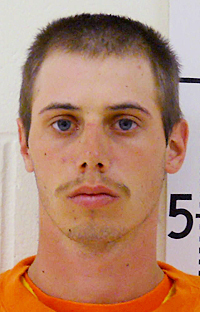The latest report from a state task force that analyzes children’s deaths and injuries says the failure of health care workers and other professionals to report suspected child abuse continues to be a major problem in Maine.
The work of the Child Death and Serious Injury Review Panel is getting attention from state officials and legislators following the death of 10-week-old Ethan Henderson of Arundel on May 8.
The boy’s father, Gordon Collins-Faunce, 23, is charged with murder, and admitted to breaking the boy’s arm six weeks earlier, according to a police affidavit.
The state Department of Health and Human Services has declined to comment about reports of abuse in Ethan’s home, citing the advice of the attorney general because of the pending criminal case.
According to the affidavit, a DHHS worker told police that the department had received a referral — though it’s unclear when — from a day care provider that Ethan’s 3-year-old half sister was “covered in bruises” and Ethan and his twin brother were sick and not getting treatment.
Family members say that Ethan was treated by multiple doctors for the broken arm, though there is no mention in the affidavit of a DHHS referral related to that. It’s not clear whether the DHHS was alerted to possible abuse at that point or, if it was, what it did.
The police affidavit quotes medical personnel saying that Ethan had both old and new brain injuries.
Therese Cahill-Low, director of the state Office of Child and Family Services, told legislators at a hearing Wednesday that while the DHHS cannot release details about an ongoing investigation, there is a mechanism to review all children’s deaths and serious injuries to improve practices inside and outside the department.
The biennial report of the Child Death and Serious Injury Review Panel, due out next month, says longstanding problems with abuse reporting continue to endanger children, Cahill-Low said.
The panel of representatives from social work, pediatrics, law enforcement and mental health fields meets monthly to review cases, examining patterns of injuries or deaths and the effectiveness of state programs.
It is one of the few entities aside from the DHHS that has access to confidential information, so it can do a thorough analysis of each child’s death or serious injury.
“I believe we’ve saved many, many children’s lives and kept them safe because we have a better system than we would have without it,” said Karen Mosher, clinical director of Kennebec Behavioral Health, who has worked on the panel for 20 years.
The panel exists to inform state policy, not identify villains, said Stephen Meister, medical director for the Pediatric Rapid Evaluation Program and co-chair of the state panel, along with Mosher.
“In spite of best efforts, bad things happen,” he said. “Our role is to kind of look at it to see if there are things that can be done in the future that can lead to better outcomes, rather than a witch hunt going after people and laying blame.”
The panel is not likely to analyze the death of Ethan Henderson until after the criminal case against Collins-Faunce is complete, he said.
“The purpose of the review is not usually a case that’s active now. It’s usually to look at how do we prevent this from happening,” Meister said. “After it’s finished with the courts, we’ll look to see if there are other patterns we should make recommendations about to change behavior. There may already be rules in place and people didn’t follow the rules.”
The panel’s 2009 report, the most recent issued, describes the case of a 2-year-old boy who suffered severe burns on his thighs and elsewhere, as well as multiple bruises. A review of medical records showed that he and his two siblings had multiple injuries and hospitalizations.
When the boy arrived in an emergency room with a severe shoulder fracture, the explanation was inconsistent with his age, the report said. That should have triggered a child protective referral and further examination, but it did not. A follow-up skeletal survey showed healing fractures in the arm, elbow and collarbone.
The report recommends that when the DHHS identifies a likely failure by someone who is mandated to report suspected abuse, the department notify the reporter of the lapse.
The report also encourages caseworkers to contact pediatric abuse specialists to determine the likely cause of fractures and other serious injuries.
In Maine, 12,000 cases of suspected abuse or neglect were reported to the DHHS last year, Cahill-Low said.
But she said the problem of mandated reporters not reporting suspected abuse has continued for years.
“In my experience in school systems and the social services field, people are very frightened and don’t want to accuse somebody of something that hasn’t actually happened,” she said.
She said she expects legislation to be proposed to amend the reporting law to clear up any ambiguity.
Randall Manning, executive director of the Maine Board of Licensure in Medicine, said he is unaware of failure to report becoming a licensing issue in Maine.
He has seen two instances in which families have complained to the licensing board when a doctor has notified the DHHS about suspected abuse, claiming it is a violation of confidentiality.
The cases were dismissed because the reporting is mandated under the law, but Manning suspects that some doctors, especially in small practices, may be wary of violating the complex federal confidentiality law known as HIPPA.
Mosher, the injury review panel’s co-chair, said some health care professionals believe it is sufficient to notify a supervisor about suspected abuse.
“When I orient people here,” she said of the mental health facility where she works in Augusta, “I tell them, ‘You are all mandated reporters. You are not required to run a report by anyone.’ I specifically do not want to muzzle our staff.”
“There are places where the staff feel they cannot speak directly to the department and they have to go through an administrative structure,” she said.
Meister said most reports of suspected abuse come from schools, followed by law enforcement, emergency room staffers and then primary care health workers, including nurse practitioners, physician’s assistants and family care doctors.
Staff Writer David Hench can be contacted at 791-6327 or at:
dhench@pressherald.com
Send questions/comments to the editors.




Comments are no longer available on this story